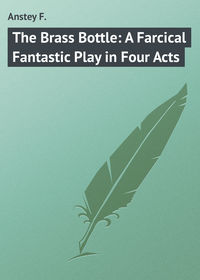
"She seemed so upset at the idea of giving them up that I said she might keep them. I shall certainly not 'sack' her, as you call it. Now I've come to know her better, I find she is a good, faithful old soul who is much too useful to part with, and you must be very careful to be civil to her in future. What was it you wanted to say to me?"
"The Lord Treasurer and I have been going into our private resources," he said. "I thought perhaps you might like to come with me to my Counting-house and – and have a look at 'em, my dear."
She was only too eager to do so. "Tell me, Sidney," she gasped, as they hurried through various corridors to the wing in which the King's Counting-house was situated. "Shall we – shall we have enough to live on decently?"
"I don't know what you will think," he replied, with an irrepressible chuckle, "but I should call it affluence myself – positive affluence, my love!"
They arrived at a heavily clamped door, where the Marshal, the Treasurer, and Prince Clarence and Princess Edna were waiting for them. "Two steps down," said King Sidney after unlocking the door.
"And here we are!" he cried triumphantly, as they entered.
The Counting-house was a huge barrel-roofed chamber lighted from windows protected by elaborate scroll-work bars. Upon shelves all round the walls, and piled in heaps on the floor, were sacks, "Every blessed one," explained the King, "chock full of gold ducats! What do you think of that, eh, my love?"
"I think, Sidney," she replied, "that I am the person who should have the key."
"There's one for each of us," he said. "Here's yours. And on that table there you'll find purses laid out, and a little gold shovel to fill them with. I've filled mine. Whenever our funds are running low, you see, we've only to come down here and help ourselves."
"Good biz!" said the Crown Prince, beginning to fill one of the purses. "I shall fill my pockets as well – save another journey, what?"
"Some of us do not possess pockets, Clarence," said his mother. "And I must make it a rule that no one is to take out more than a purseful at a time, and only after satisfying me that the money is required for some legitimate purpose."
"I don't think such precautions are at all necessary, my dear," said King Sidney. "Marshal Federhelm seems to have put by a good deal while he was Regent. And besides, there's plenty more where this comes from, you know!"
"And where does it come from?" inquired the Queen.
"Why, the Treasurer tells me, we've a mine of our own in the Golden Mountains a few miles from here – a mine that is practically – ah – inexhaustible. I rather thought of driving over to see it some day."
"Let's all go!" said the Crown Prince. "Why not this afternoon? It'll be something to do!"
Queen Selina was pleased to approve the suggestion. "We certainly ought to show that we are interested in industrial concerns," she said. "All the best Sovereigns do. I can't help wishing, though, that poor dear Papa could have come with us. He knew so much about gold mines."
"Just as well for us he can't," said Clarence, "because he'd be the Boss, then! I say, I've got an idea. Why not take one of those sacks in the coach with us and chuck money out of the window to the crowd, what?"
"Look too much as if we were out for a beanfeast, my boy," objected his father.
"And what's the matter with a beanfeast? Believe me, it will make us jolly popular and be a lot better fun than just bowing to the blighters."
"And far less fatiguing," said Edna.
"There's something in what Clarence says," said the Queen. "It would increase our popularity – and that is so important. Of course we shouldn't make a practice of it, but we can quite afford it, just for once – what do you think, Mr. Marshal?"
The Marshal thought it was an excellent notion.
The Golden Mountains were not much more than a couple of leagues from Eswareinmal, and the roads being tolerably good, a lighter vehicle than the State Coach and six sturdy horses accomplished the journey in very good time. In the streets they passed through and at various villages along the valley, crowds had collected, and the enthusiasm with which they scrambled for the coins that were showered from the carriage windows proved how fully they appreciated the benefits of an established Monarchy.
"Don't throw any more now, children," counselled Queen Selina as they neared the mine. "We must keep some for the dear miners. Sidney, be sure to ask some questions about the machinery, and whether they're all happy and comfortable. And do it tactfully, because I've always heard miners are such a very independent and intelligent class."
Perhaps even so short a residence in Märchenland as theirs might have prepared the Royal party for the unusual. But it was an undeniable shock to them all to find, on arrival at the mine, not only that the method of working was primitive to the last degree, but that it was entirely conducted by diminutive beings who were unmistakable Yellow Gnomes. The interior of the mine resounded with the blows of pickaxes, but the inevitable trumpeters had no sooner announced that the Sovereigns had left their coach than all work was suspended. The miners swarmed up from their tunnellings, literally tumbling over one another in their haste to behold the countenances of Royalty.
"They seem – ah – a remarkable lively lot," observed King Sidney as some of the Gnomes turned somersaults and Catherine wheels around their visitors, while the more retiring stood unassumingly in the background on their heads. "A bit undersized, and, judging from their complexions, I should say the work had affected their livers. But it may only be due to the gold-dust."
"They don't seem to realise a bit who we are!" complained Queen Selina. "Sidney, did you see that? One of the little wretches has just taken a flying leap over my very head!"
The Baron, who had followed in another coach, explained that these demonstrations were merely intended to express loyal delight.
"Oh, if you say so, Baron," she said. "But anyone might easily mistake it for impertinence. If it was not hopeless to expect an intelligent answer from people who seem unable to stay right side up for a single moment, I should like to know what wages they receive and what they live on."
The Court Chamberlain informed her that the Gnomes got no wages and required little in the way of food, their favourite diet, he believed, being earth.
"Revolting!" was her comment. "No wonder they look so unwell! Still, their living cannot cost much, so I should think, Sidney, if we gave the – er – foreman a gold piece to be divided amongst them, that would be amply sufficient."
King Sidney thereupon presented a ducat to the most important-looking Gnome, who immediately let it drop indifferently.
"Wonder why he did that?" said the King. "Doesn't he think it's enough?"
"Knows too much about how it's made, I expect," said Clarence. "Like the chap at the Marmalade factory."
"Well, it's a pity to waste it," said his father, picking up the coin. "I should like to see them at work before we go."
His wish having been conveyed to the Head Gnome, the whole band rushed, yelping and screeching, back into the galleries, seized their picks, and began hacking at the gold which gleamed in veins of incredible richness through the rocky walls and roof of the caves. But perhaps their efforts would have been more effective if they had not been quite so apt to get in one another's way.
The visitors then inspected the furnace where the ore was melted, and the Mint where it was stamped into big fat coins. These were put up in sacks for transmission to the Royal Treasury, but, as a fresh batch had been delivered only recently, the supply in hand at the Mint was not very large just then.
"I did like those Gnomes!" said Princess Ruby on the way home. "Didn't you, Mummy?"
"I should have liked them better, my dear, if they had been more like fellow-Christians. Sidney, I shall insist on their wearing some civilised costume."
"By all means, my love, if we continue to employ them. But I rather think it would be better to get rid of them altogether."
"Get rid of them, Sidney? What in the world for?"
"Well, you see, my dear, at the last General Election I took a somewhat prominent part in denouncing the Conservatives for employing Chinese labour in the South African mines. It would be very awkward if people at Gablehurst found out that our entire income was derived from – er – 'Yellow Slavery.'"
"Stuff and nonsense, Sidney! Who do you suppose is likely to tell them?"
"You never know how things get about," he said uneasily. "And, as a consistent Radical, it – it goes against my conscience."
"Conscience, indeed! My dear good Sidney, if you go and get rid of those Gnomes, who seem perfectly happy and contented, there'll be no one to dig the gold!"
"We could hire full-grown white labourers, my dear. Of course at a living wage, but, as they would work more systematically, they would obtain a far larger output, so we should make a handsome profit by the change."
"Ah, when you put it like that, Sidney, it makes all the difference. I could see for myself that those hideous little horrors weren't taking their work seriously."
"There's to be a State Council to-morrow morning," said the King. "It would be a good opportunity to inform them that we do not intend to countenance slavery any longer."
"That ought to have an excellent effect," Queen Selina replied. "I shouldn't wonder if it made us more popular than ever… Why, we're back in the city already!.. How delighted the dear people seem to see us!.. Yes, Children, you can empty the sack. The love of one's subjects is well worth the money – and it's not as if we were ever likely to miss it!"
The next morning after breakfast the King and Queen held their first State Council, Prince Clarence, of whose business capacity both his parents had a great opinion, being given a seat at the board. There were, it appeared, various measures on the agenda which, as the President explained, were of the highest political importance, being concerned with the settlement of such matters as the precise number of cherries that were to be strung on a stick and sold for a groschen at old women's fruit-stalls; the dimensions of the piece of jam that a huckster should be permitted to put in his porridge; whether the watchmen's horns really needed new mouthpieces, and, if so, whether these should be of ivory or bone. Questions which had to be given the fullest consideration and debated at prodigious length before the Sovereigns could be asked to affix their signatures and seals to the decrees.
Clarence fidgeted with undisguised impatience, and King Sidney was more than once under the necessity of raising the golden hand at the end of his sceptre to his lips in order to conceal an irrepressible yawn. But at last the state business was disposed of, and the King was able to introduce his own. It was clear from the vehement wagging of the Councillors' white beards while he was announcing the Royal intention to emancipate all Gnomes at present in the Gold mine, that they regarded the new departure with no great favour. The President himself, although he admitted that it concerned the Sovereigns more closely than any other person, pointed out certain objections which he begged their Majesties to ponder. And Councillor after Councillor rose and protested against the scheme with the utmost solemnity and prolixity.
Queen Selina, who was now far more eager than the King to have the mine reorganised on a more paying principle, would have answered the critics herself, if Clarence had not induced her to leave the reply in his hands.
"Well," he said, rising, "have you all done? No other gentleman wish to hear himself talk?.. All right then. Now I'll have my little say. Of course, what the venerable old Father Christmas in the chair told you was perfectly correct. If we choose to set these little beggars free, it's no business of anybody but ourselves. The Guv'nor – that is to say, his Majesty – was merely telling you about it – not asking what you thought about it. Sorry if you don't approve, but we shall get over it in time. And really, your objections, if you won't mind my saying so, are absolutely footling. All they amount to is – because Gold Mines here always have been worked by gangs of Yellow Gnomes, therefore they must be for all time. Now that's just the kind of fine old crusted pig-headed Conservativism that's kept this the stick-in-the-mud Country it is! Look at the sort of business you've been wasting our time in jawing about to-day – why, in the country We came from, a Rural District Council would have settled it all in five minutes if they thought it worth bothering about at all. Street lanterns and watchmen's horns and old women's sweet-stalls indeed! If you could only walk through – I won't say one of our Cities, that might be too much of a shock for you – but through an ordinary suburb such as we lived in, and saw how things were done there, it would open your eyes a bit, I can tell you! You've been marking time all these centuries while other Kingdoms have been making progress. I'll tell you about some of the things we've learnt to do and use, just as an ordinary matter of course – and you haven't so much as heard of."
Here he gave them a vivid description of the chief inventions and discoveries of the last eighty years, from the steam-engine to the aeroplane, which latter, he declared, put their sixty-stork-power car completely in the shade.
"If it is the fact," said the President, "that the inhabitants of your Royal Highness's Country can work such marvels, you must be even mightier magicians than were they whom our late King so wisely suppressed."
"You're wrong there, old bird!" said Clarence cheerfully; "no Magic about it whatever. All done by brains and enterprise, but – and this is what I am trying to knock into your heads – if we'd been governed by a set of stuffy old fossils like yourselves – if you'll allow me the expression – we should never have got a blessed thing so much as started!"
Many, if not most of the Council were sceptical as to the possibility of such inventions as Clarence had described, but the good old Baron assured them that, even during the short time he was in England, and although it was night, he had witnessed many of them with his own eyes, thanks to the powerful illuminants which made darkness almost as light as day. He exhorted his hearers to count themselves fortunate in having gained Sovereigns who possessed such wondrous powers, since their faithful subjects would assuredly now enjoy the benefits of them.
"Aye," said the ex-Regent – though possibly not in such good faith as the Baron. "We shall indeed have reason to congratulate ourselves if his Royal Highness will graciously teach us how to construct one of these fire-and-smoke-breathing engines that draw a line of waggons along roads of iron, or even a mast that will send messages through a thousand leagues of air."
"You don't want much, do you, dear old boy?" said Clarence. "You don't suppose I can show you how to build a railway train when you haven't got any of the bally materials or appliances, do you?"
"Your Royal Highness has but to name them, and they shall be procured."
"They're not to be got here," replied Clarence. "If I tried to tell you what they were, you wouldn't be any the wiser!" He spoke nothing but the truth, for he had but the sketchiest acquaintance with the composition of any kind of machinery.
"Perhaps His Majesty," suggested the Marshal, who had long ago taken King Sidney's measure, "is better able to instruct us in these mighty secrets?"
"H'm, well, to tell you the truth," confessed the King, "although I've been in the habit of using railways, motors, electric light, telephones, and so forth constantly, I can't pretend to more than a general notion of how they work. Couldn't make any of 'em, you know. Not my line of business!"
"If that is indeed the case," said the President, "we find it the more difficult to understand why his Royal Highness should have reproached us for an ignorance which is no greater than either his own or your Majesty's."
"I wasn't reproaching you," said the Crown Prince, a little awkwardly, "I was only telling you how differently things are managed where we come from. But after all, that isn't the point, so we'll say no more about it. Let's get back to the Gnomes. One of you – I think it was the gentleman with the grey topknot – objected that there was no other useful way of employing them, except in the mine. Well, of course, we've thought all that out," he declared, though, as a matter of fact, the idea had only just struck him. "We intend to set 'em to work at laying out a golf links, and when they've done that, we shall keep 'em on as caddies. They're such nippy little devils that they ought to be jolly useful… Ah, naturally, you wouldn't know what Golf is. Well, Golf happens to be a thing I do know something about. I can teach you that right enough. It's simply the greatest game going, and you'll be grateful to me for introducing it. Don't worry," he added, as some of the Council expressed dissent, "nobody's asking you to learn unless you like. I shouldn't say myself that any of you – except perhaps the Marshal – was very likely to shape into a 'plus' man. I fancy he's got the makings of a golfer in him, though, and, once I've got the course laid out and given him a lesson or two, I bet you'll see he'll be as keen as mustard."
Before the Council broke up, the ex-Regent undertook that, as soon as Clarence had selected the ground, the Gnomes should be removed from their present quarters, and placed under the Crown Prince's directions.
"Never again, Sidney," declared the Queen afterwards, "will you and I sit through one of those tiresome councils! We'll leave them to manage their own silly business, and if there's anything that requires our signatures, they can bring the papers to us, and we'll sign them in our own rooms. If there should be any difficulty, we can always ask the Marshal – he's so very sympathetic and helpful."
"Very," said the King, "oh, very – that is, I half fancied now and then – but I believe he means us well. Yes, on the whole, my dear, I think he's a person we can trust."
"You needn't think about it, Sidney," she replied; "you can feel absolutely certain that there's nothing that man wouldn't do for us!"
CHAPTER VII
A GAME THEY DID NOT UNDERSTAND
With regard to the Royal visit to the Gold Mine, it should be mentioned that, on returning to the Palace, the Queen and Princess Ruby had met Daphne in one of the galleries. Ruby ran to her impulsively: "Oh, Miss Heritage!" she cried, "we've had a ripping afternoon. Such fun throwing money to the people, and seeing them scramble for it! We saw the Gold Mine. And all the darling little Gnomes! You would have loved them! I do wish you had come with us!"
"I fully intended to have arranged for you to do so, Miss Heritage," said Queen Selina, with unwonted graciousness. "But with so much to think of – ! Do you happen to know where my other ladies-in-waiting are?.. In the Tapestry Chamber? Then I must get you to show me to it, for I don't know my way yet about this immense house… Through here? Yes, you will accompany me – in fact, I particularly desire you to be present."
At her entrance the Maids of Honour all rose from their seats and made obeisances which, but for the Court Godmother's revelations of their ancestries, would have occasioned their Sovereign agonies of embarrassment. But she felt she could face them now without mauvaise honte, and indeed with all the assurance of superiority.
"You may sit down, girls," she said, and although they found it hard to believe at first that they could be the persons thus addressed, they sat down.
"And what are you all about?" she inquired. "Embroidery, is it? The pattern seems rather large… Oh, tapestry? I see. I prefer a bright, cheerful paper on the walls to any tapestry myself. Only collects dust. Now if you were to knit some warm woollen jerseys for those wretched little Gnomes, who are really in want of them, you would be doing something useful. But that wasn't what I – ah, to be sure, I remember now. I looked in to tell you, girls, that I have appointed Miss Heritage here as my First Lady-in-waiting. You will be careful to address her in future as 'Lady Daphne,' and treat her in all respects as your equal in rank… I don't know why you should look so surprised." (If they did, it was merely that any such recommendation should be thought necessary.) "Miss Heritage's parentage may, it is true, be obscure – but not more so, from all I have been told, than that of most of your own ancestresses. Indeed, I am much mistaken if she has not a better claim to be considered a lady than any of them. Not that I think mere birth of any importance myself, but I object to people giving themselves airs without some real ground for it. I am not alluding to Lady Daphne, whom I have always found perfectly well-behaved and unpretentious."
This was not perhaps the surest way of endearing Daphne to her new companions, but then Queen Selina was less concerned to effect that than to make them pay for the excessive deference she had so mistakenly shown them in the past.
However, in their simplicity it had never occurred to them that they had any cause to be ashamed of their descent, and so they never imagined that their Royal Mistress could insult them with it, and her shafts missed the target.
Fortunately for Daphne, too, she was already the object of a secret schwärmerei that left no room in their sentimental bosoms for jealousy or ill-feeling.
But, not being aware of this as yet, she was rendered only unhappy by this sudden rise in the Royal favour. Her one consolation was the certainty that it would not be very long before she was again in disgrace.
On the afternoon of the day on which the State Council had been held, the Crown Prince explored the surrounding country with a view to selecting a golf course.
He found a district which was in every way suitable for his purpose – a stretch of undulating land in a valley behind the plateau on which the Palace stood, abounding in natural hazards, and affording great facilities for artificial ones – in short, an ideal site for any links. He began laying it out the next morning. The Gnomes were brought out of the mine and conducted to the spot. The general idea was conveyed to a Gnome who seemed, on the whole, less devoid of intelligence than his fellows, and they all set to work with more activity than immediate result. However, they seemed to take kindly to their new industry, and Clarence was very well pleased with them. He had had no experience in golf-architecture himself, but the nature of the ground was such that it required but little to turn it into a very sporting course indeed, and, if the Gnomes did not do much else, they constructed some remarkably cunning bunkers.
While they were thus engaged he ordered several sets of clubs to be made from rough designs of his own by a master artificer in Eswareinmal, who carried them out with considerable skill and fidelity. The implements he produced may not have been quite according to Club standards, but they were fairly serviceable. The balls seemed at first likely to be the main difficulty, but some were discovered on the toy-stalls in the market square which, though not of rubber, were composed of a substance that proved an admirable substitute. They were certainly open to one objection that, in ordinary circumstances, might have disqualified them – they cost considerably under a farthing each. But Clarence got over that by paying a ducat apiece for them. And then, as the work progressed but slowly, he was forced to wait with what patience he could until the links were ready for practising on.
It does not take long for most people to get accustomed to any surroundings, no matter how novel, and Queen Selina and her family soon became acclimatised. Now that her household had lost their terrors for her, she began to enjoy the sensation of being a Queen and inspiring reverence and awe wherever she went, though she could have wished to be the ruler of a Kingdom that was not quite so outré as Märchenland. However, she felt she must take it as it was, and in a short time she had almost forgotten that there ever had been a period when she had not occupied a throne.






